#the myth of apollo
Text
The myth of Apollo (2)
This is a loose translation of Alain Moreau's article "The Antique Apollo: Shadow and Light".

II/ The ambiguous god
The mystery that shrouds Apollo’s origins, this enigma that disconcerts the scholars, had the advantage to allow the artists a freedom of imagination: since the shape of the primitive character of the god is drowned and blurred, he can be depicted as either a god of light, or a god of shadow and death; However, even within the most clear-cut portraits, his complexity remains. Apollo is never a god entirely just and good ; but he is never fully aligned with malevolent powers.
According to the beginning of the Iliad, Homer chose to depict the dreaded aspect of the go. Apollo, angered against Agamemnon’s army, hits them with a terrible disaster, (nousos, loimos), the plague: “A terrible sound came out of the silver bow. He first attacked the horses, like fast dogs. Then, it is men that are hit by his sharp arrow, and the funeral pyres burn hundreds ceaselessly.” Fervent enemy of the Greeks, it is Apollo that throws against the Achaean wall all the rivers of the Mount Ida ; it is also him that hits Patroclus in the back and offers him unarmed to the spear of Hector. And yet, this terrible god is also the one that brings a painless death, and then the cruel arrows become the “soft arrows”. He is hostile to the Achaeans, but he brings a tireless protection to the Trojans. Aeneas, Glaucos, Hector are all helped by him. He constantly assists them, recomforts them, stimulates them, saves them. If his shot brings death, it can also repel evil. Apollo is “the one that preserves” (hekaergos). Throughout the centuries, many epiclesis will attest this trait: alexikakos, apotropaios, epikourios…
In a reverse way, the “Homeric Hymn”, which is all about the glory of this conquering god who is eternally young and beautiful, oes not hide his “boundless pride”, and he is shown easily tricked. Young Apollo does not have the same temperance and moderation that will become the fundamentals of the Delphi wisdom, engraved on his very temple (“Know thyself”, “Never too much”) ; and young Apollo also lacks the omniscience of his father Zeus.
But with Pindar, at the beginning of the Classical age (5th century), he gains omniscience: in the “Pythics” he is described as “knowing the fatal term of all things and all the paths they take”, as “being able to count the leaves the earth grows during spring, and the grains of sand that roll under the waves of the sea or the river, and the flows of the wind” ; and as “you who sees clearly the future and its origin”… As a generous god, he also offers to humanity benevolent gifts, and maintains peace: “It is him that gives to men and to women the remedies that heal cruel diseases ; he gave us the cithara ; the Muse inspires those that please him ; he places in the hearts the love for concord and the horror of civil war. He rules the prophetic sanctuary.” As a son of Zeus, he himself becomes the embodiment of the divine, of the unnamed, of the celebrated “theos”. But Pindar didn’t go as far as to erase the other Apollo, the cruel god of destruction. Apollo takes his revenge over an unfaithful Coronis by sending Artemis, a merciless and blind executioner, to kill her with a brutal death – and so will perish numerous innocents whose sole crime was to live near the culprit.
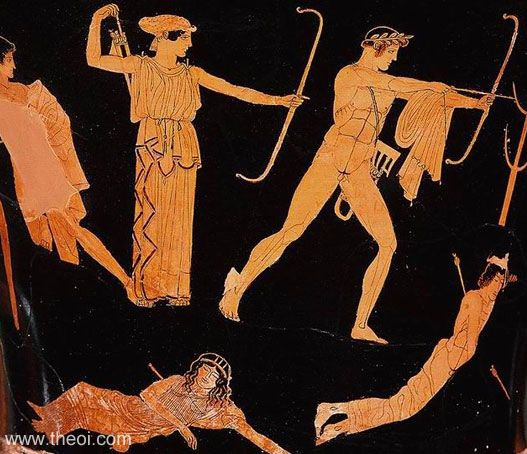
Aeschylus’ Apollo, contemporary to the one of Pindar, brings a halt to the evolution of the god – and even a regression. In his tragedies, we have a bloodthirsty god that massacres with his arrows all of Niobe’s sons: his wrath is unflinching. Laios disobeyed the oracle: at the seventh door, the god will cause the fratricide of his grandsons Eteocle and Polynice (The Seven Against Thebes). Cassandra did not keep her promise: she will be mocked, captured and murdered. But the god, just like the perjury girl, does not hold his promises: after predicting to Thetis that all the gods will protect her bloodline with all of their love, he kills her son Achilles (The Judgement of Weapons). He is a god that scares people: “Phoibos” is close to “phobos”, fear and scare (The Persians). “Apollon” is close to “apollôn”, “he who destroys” (Agamemnon). The justice Apollo offers is an archaic justice, a vendetta logic: kill the one that killed. When he fights the Erynies within the play “The Eumenids”, he is not above them in any way: they have the same violence, the same bad faith, the same contradictions. And yet… this god is invoked by the messenger of Argos as the savior and the healer (Agamemnon). This imperfect god is the ambassador of Zeus, as it is highlighted many times during “The Eumenids”. This conquering god settles with pacifism on the ancient throne of Delphi: within “The Eumenids”, no murder of any dragon is mentioned. The god of darkness keeps some traits from the god of light.
The regression of Apollo within Aeschylus’ plays is explained by the turmoil of a world that was building: the Greek city was being born among a set of social and political tensions that impacted the way the thinkers saw the cosmos. Euripides’ own regression of Apollo can be explained by a world that is falling apart. The cities are fighting with each other, beliefs are weakening, the gods are falling from their pedestal and are lowered to the same level as mankind. It is the Dioscuri that absolve Orestes of the death of Clytemnestra. And the culprit of the crime is designated as Apollo, which gave “an unwise order” (Electra). A god full of grudges, he never forgives any offense. It is within his own sanctuary, in a treacherous way, by the arms of a thousand men, that he takes his revenge upon Pyrrhus, right as the latter was coming to make amends: “Here is how the Lord that gives oracles, the arbitrator of the law for all humankind, treats the son of Achilles as he was offering reparation! Just like a wicked man, he remembered old feuds. How could he then be wise?” (Andromache). Another proof of his lack of wisdom: he rapes Creusa. “Ah! Do not act in such a way ; if you have the power, practice the virtue! Because anyone who is wicked is punished by the gods. Then, how can we stand that yourselves, that make laws for the humans, be recognized of violating those laws? (Ion).
And yet, the Apollo of Euripides can also be as shining as the god of Pindar and of the Homeric Hymn: “How beautiful are the children of Leto, that she of Delos birthed in the fecund vales of the Isle – the golden-haired god, knowledgeable lyre-player, and the goddess proud in her talent at shooting with a bow!” (Iphigenia in Taurid). The bloodthirsty god can preach for peace: “Go you way, and may the most beautiful goddess, Peace, be in your home with honor.” (Orestes). And, while the poet is very critical of the god’s actions during “Ion”, he still sings the luminous and cosmic beauty of Delphi which, according to him, would have never been as great as it is if it wasn’t for the grace of its god: “Here is the brilliant four-horse chariot: Helios, already, sheds light upon the earth. And the stars flee the ether that is enflamed among the sacred night. The untouched peaks of the Parnassus, drowned in light, welcome for mankind the disc of the day.”
The ambiguity of the god, tied to his origins, is maintained as much within the works of those that criticized him, as in the texts of those that admired and respected him.

27 notes
·
View notes
Text


BEST MOM
#art#my art#digital art#digital drawing#artwork#digital#greek mythology#Leto greek mythology#Leto#apollo greek mythology#apollo greek god#apollo god#artemis#greek goddess#greek myths#greek myth#ancient greek#greek gods#tagamemnon#apollo and artemis
1K notes
·
View notes
Text

Apollo (and 2-day-old hermes) doodle
1K notes
·
View notes
Text
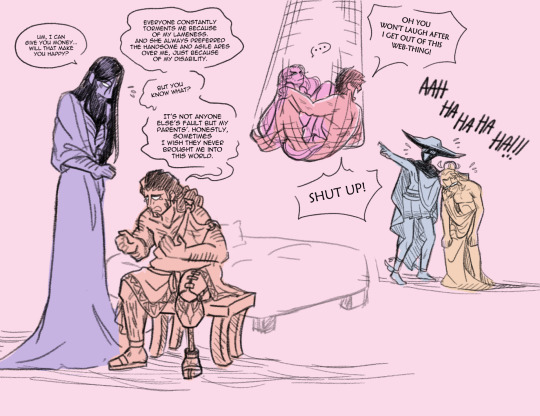
You are having a breakdown because your wife just cheated, and no one is really that good to give you any comfort.
#greek myths#greek mythology#greek gods#poseidon#hephaestus#apollo#hermes#aphrodite#ares#doodlysketch#short comic
1K notes
·
View notes
Text

The fact that Python is Apollo's greatest enemy and snake is Asclepius' sacred animal will always be funny
Part 2
#Apollo#Asclepius#greek pantheon#greek mythology#greek gods#mythology#greek myth art#apollogists#dadpollo#python#chiron#toa#pjo hoo toa#trials of apollo#riordanverse#my art
5K notes
·
View notes
Text

Looks like someone's happy to be back in the spotlight...
#apollo#toa#toa apollo#pjo#greek mythology#greek myth art#solar eclipse#painting#digital art#artists on tumblr#jess's art
734 notes
·
View notes
Text
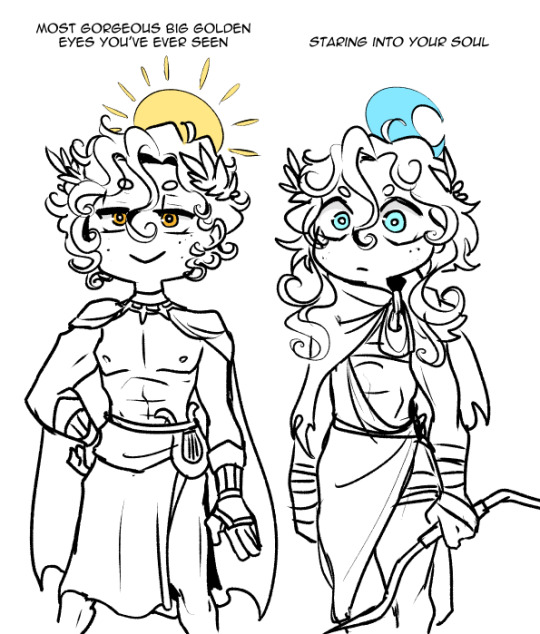
testing out apollo and artemis
971 notes
·
View notes
Text
Apollo, in a high voice, holding barbie: hey ken! I was thinking about going back to school and starting a career!
Artemis, in a deep voice, holding ken: nonsense, barbie. you’re staying home and having my kids
Hermes: what the fuck are you guys doing?
Artemis: playing systemic oppression
#Artemis#apollo#Hermes#greek mythology#classics#greek myth#greek myths#tagamemnon#greek gods#mythology#gods and goddesses#greek gods and goddesses#classics memes
2K notes
·
View notes
Text
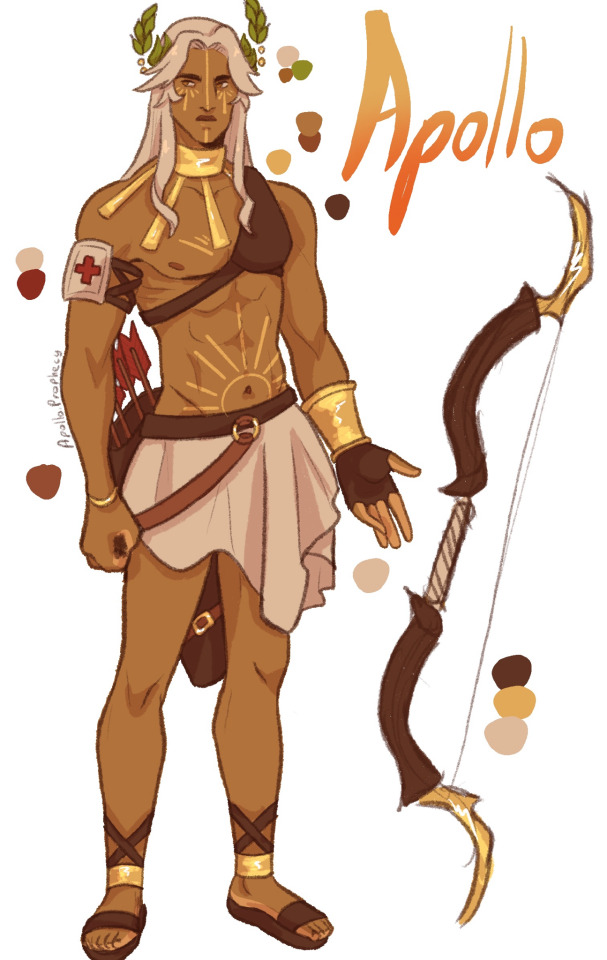
Forgot to post Apollo lol - He’s here now! 🔆
I’ll also get back on my creepypasta grind - comment ideas you wanna see in my style!
#greek myth art#greek gods#greek mythology#greek pantheon#ancient greek#apollo#god of sun#god of medicine#god of poetry#god of music#god of light
948 notes
·
View notes
Text
to all those new comers to the Percy Jackson world and being off on shipping Percabeth because Poseidon and Athena are uncle and niece, it’s stated in the books (specifically The Lost Hero) that gods don’t have DNA the way humans do.
and if that still doesn’t convince you or you may think it’s not a real or valuable explanation, let’s recall other ways that births happen in both greek myths and the Riordanverse:
- Zeus birthed Athena from his brain
- Athena’s demigod children are born the same way. out of her mind. so Annabeth is already way off from the usual goddess birth route
- Zeus also birthed Dionysus from his thigh
- Hephaestus was born from Hera and Zeus, but in a lot of versions its actually Hera who just had him by herself. she got pregnant and it happened. they’re gods. (then chucked him down a mountain) again, they’re gods.
- Hebe, goddess of youth, was born from Hera and a piece lettuce she ate
- in the Trials of Apollo, we learn that Kayla Knowles, daughter of Apollo, has a human father, Darren. meaning she has two fathers: Darren and Apollo. no mother involved in her creation whatsoever.
- Zeus has impregnated quite a large number of people during his time and in various different forms. one of the weirdest ones by far was when he came to a queen in the form of a swan, embraced her as that swan and nine months later she gave birth to two eggs. they hatched and inside was Helen of Sparta (as in Helen of Troy), Clytemnestra, Castur and Pollox.
- Poseidon and Medusa had a child and that child was born from Perseus cutting off Medusa’s head. that child was Pegasus. (yes, that Pegasus) (also some other dude was born too)
- Aphrodite was born out of sea foam made from the severed genitals of Ouranos that fell to the oceans
have i convinced you already? are we done here?
#like seriously do you know how weird greek myth births are?#how can anyone see twins hatch from eggs and think ‘huh DNA? lets find out’ like no#there is no DNA#apollo becomes a hummingbird for days on end and probably has children in dofferent forms of animals too#he can become pure light#and you wann boil it down to DNA#booo tomato tomato#percy jackson#percy jackon and the olympians#percy series#pjo#annabeth chase#percabeth#trials of apollo
918 notes
·
View notes
Text
The myth of Apollo (4)
As with Dionysos previously (see here), the Dictionnary of Literary Myths of Pierre Brunel offers two different articles about Apollo. Here is the loose (but free !) translation of the second one, « Apollon, the mythical sun ».
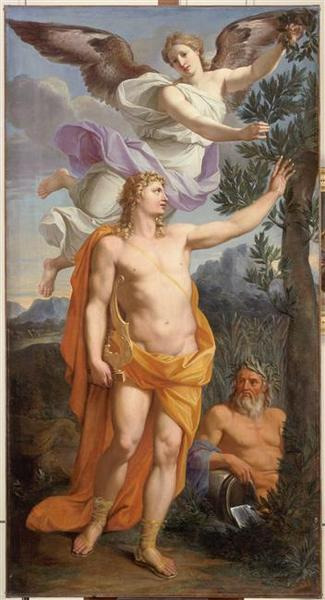
APOLLO, THE MYTHICAL SUN
Pontus of Tyard wrote in 1552: “Of all the poetic gods, Apollo is the one that has been the most disguised by the fables and the etymologies of his name.” The mythical figure of Apollo, which has been turned in Western literature as one of the most conventional figures there can be, was considered by ancient mythographers as an extremely complex character, because he was given many names and many properties. Apollo is first and foremost an universal archetype of the Divine, of which literature kept – alternatively as much as indiscriminately – three main names: Apollo(n), Phoebus, Sun. The chronological evolution of the god allows us to isolate and separate the solar god (as a symbol) from his mythological adventures, since the solar Apollo is more present within poetry than within legends.
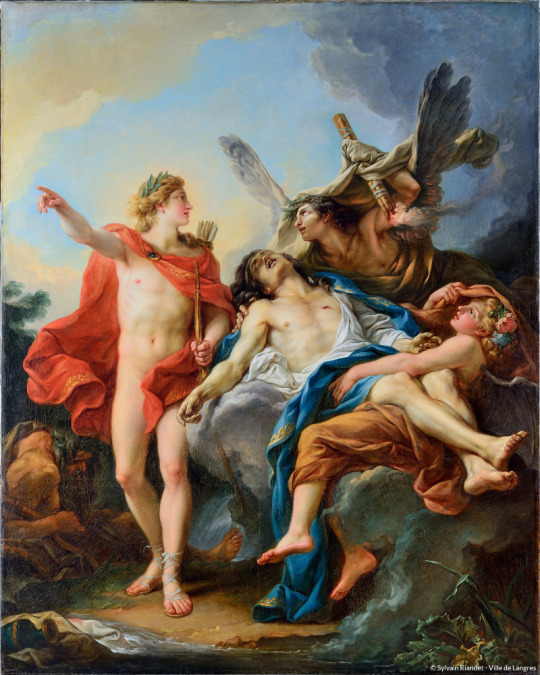
I/ The names of the Sun
In the Platonic tradition, all the way to the end of the Renaissance, numerous significant and diverse etymologies were invented for Apollo, all reflecting the various functions of the solar god. Within the name Apollo(n), interprets can read as much an idea of destruction as an idea of freeing (from the verb “luô”, to untie) or purification (from the verb “louô”, to clean). This reflects the “drying” effects of the sun, which can be negative or positive – and thus is a survival of the ambiguity of the archaic god.
The interpretations found within the “Cratylus” (see the previous part of “The myth of Apollo”, “The Antique Apollo) allow us to define the four main attributes of the god: medicine, divination (both seen as manifestations of “purification”), music and the art of shooting with a bow. The name Phoebus has been associated by Isidor of Sevilla with the endless youth of the ephebe (e-phoebus), while Cartari (in 1556) linked it to the vital light (phôs, light, bios, vie). For Platon, the name of “Sun” within Ancient Greek meant he who “nuances” the colors (“helios”, the sun in Greek, derived from “aïoleïn”, to nuance) ; and all the ulterior commentators assimilated it with the Latin “Sol”, tied to the adjective “Solus” (the sole, the unique, the lonely), a link which can be found in the neo-Latin languages (in French “soleil” and “seul”, for example). Cartari, who was follow the works of Plotin and Macrobe, linked this precise etymology to the Greek name of Apollo that he translated as “he who is not multiple” (“a” as a privative + “polu”, many) – highlighting again the important idea of unity within the idea of the sun-god.
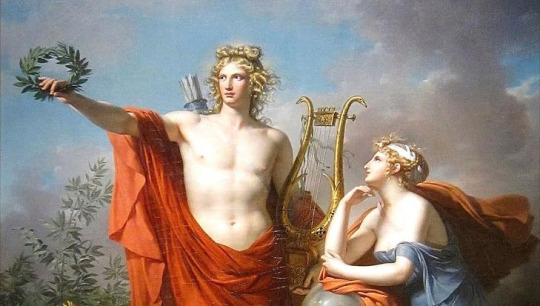
II/ Main attributes
The mythographers of Renaissance made a very useful synthesis work that offers us in their roughly definitive state the various interpretations of the myth of Apollo, compiling together the commentaries from Antiquity, the interpretations from the Middle-Ages, as well as the point of view of some Oriental civilizations. Within his “Images of the Gods” (1556), Cartari divides the solar myth in a series of elements linked together as part of a long allegorical chain:
1) The sun represents at first, in the diversity and universality of its effects, an archetype of the Divinity. The Assyrians assimilated it to Jupiter as the soul of the world (because through all the other gods, it was always him who was evoked). As such Macrobe noted in his “Saturnals” that all theology always returned to the worship of the sun.
2) As a symbol of eternal youth, as the allegory of the always-new day, of the always-resurrecting light, Apollo is depicted as beardless (except for the Assyrians) and is associated with Dionysos.
3) Because of its central position within the Universe, it is called “heart of the heaven”, by analogy with the vital function of this “pulsing” organ within the human body. The sun is the source of light that communicates their movements to the other astral bodies. It is why Apollo is sitting in the middle of the nine Muses, allegories of the nine celestial sepheres, and with them he embodies the Harmony and the Universe, as a symbol of “symmetry and concordance” (according to Tyard). As such the Music of the Spheres, that R. Lulle will represent through the “Great Lyre of the Universe”, is reflected in Apollon’s association with Music and Poetry (Poetry which was originally simply the art of singing).
4) The rays of the sun are depicted by the arrows of Apollo (just like by those of his sister Diana). They can penetrate the very core of the earth – it is why there is an archaic tradition according to which Apollo is a chthonian or infernal god (and can sometimes be called Hecate, since the primitive gods were without genders).
5) It is due to the purgative and drying effects of his rays that Apollo is also the god of medicine. Mythographers tie this function of the god to the fable of the snake Python killed by Apollo soon after his birth: they assimilated Python to the mythical Flood, as a principal of morbid humidity wrapped around the earth.
6) The attribution of the laurel to Apollo, and the fable of Daphne, are explained by the medicinal virtue of the plant, the always-green plant that never rots, and that the mythographers saw as a symbol of Health. The laurel is also tied to the alchemical symbolism of Humidity, because Daphne was metamorphosed thanks to the intervention of her father, a river-god.
7) Finally, Apollo is the god of divination, because he is the eye of the sky, he sees all and he reveals all secrets (hence why in mythology Apollo was the one who denounced the adulterine love of Venus and Mars). He has the role, within the Universe, of the eye within the human body – he is the “spy of the intellect”, the “censor” or the “rector”, and his eminent position makes him a sign of omnipotence. Cartari described a hieroglyph that designated the sun as a scepter surmounted by an eye – which would identify the mythical sun with the idea of royalty.
Such a synthesis – within which each of the god’s main attributes were defined and linked together – as the interpretative model which was used as a basis for all ulterior poetry. For example take Du Bartas: in his “Sepmaine ou Création du Monde », in 1578, the sun, which is not a god anymore but a mere « ornament of the sky », is always designated by metonymy through a series of names that resume all the attributes of the solar god in his cosmic function: Phoebus with gold hair, the blond Titan, the Torch of Laton, the Archer, Apollo giver-of-souls, the Fountain of Heat, the Life of the Universe, Giver-of-honors, King of the Sky, Eye of the Day, Censor, Torch of Delph, Torch of Delos, he who “makes the face of the world young again”. In a parallel way, from Cartari’s work, the different aspects of the character will be slowly simplified until he simply becomes the god of Poetry, crowned with both sunrays and laurel leaves, sitting among the Muses on top of mount Parnassus, always holding his lyre (which can sometimes represent him in his entirety), distilling the poetic inspiration under the shape of the Hippocrene spring (created from Pegasus’ hoof), a spring that Ronsard will describe as “the fountain of verses”.
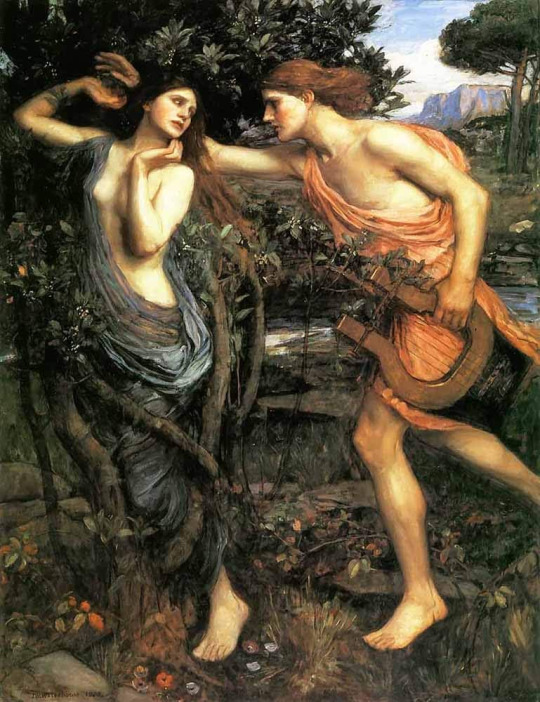
III/ The philosophical Sun
Symbol of the Philosophical Gold in the alchemical tradition, uniting the fundamental opposites that are the fire and the water, the dry and the wet ; or a symbol of the divine creative soul within Orphism and Pythagorism, the go of Poetry s the very image of all creation within the Neoplatonic literature, in which Apollo with his lyre is always associated to his “mortal double”, Orpheus. Within the Renaissance, Apollo was the god who inspired the “Poetic Fury”, without which the lyrical production cannot be: it is under his influence that (according to Ronsard’s Hymn to Autumn) the spirit can “penetrate the secret of the heavens” and the soul “rise among the gods”. It is under the sign of Apollo that the soul finds back its celestial origin through the effects of the divine enthusiasm (from the Greek “theos”, god): this is the Orphic origin of poetry. For Ronsard and the poets of La Pléiade, the “inspired Poet” is both the “prophet” and the “priest” of Apollo (hence why in the 16th century it was believed that the Sibyls and the oracles were exceptional poets).
This Neoplatonic interpretation of the myth, which confuses the two main attributes of the god, prediction and lyrical art, this same tradition that shaped the image of Apollo we have today, relies on the commentary by Marsile Ficin of “The Symposium”, which divines four different divine “furies”, associated with four patron-deities. First is the highest, the poetic fury, which is caused by the Muses ; second is the “mystery fury” or the sacerdotal fury, which proceeds from Dionysos ; third is the prophetic fury, given by Apollo ; fourth is love, and it originates from Venus. Despite the distinction marked within this text between the Muses and Apollo, poets usually invoke indifferently one or the other – the god understood as the “universal principle” and the Muses as allegories that represent the individual repartitions of the poetic virtues. It should be noted that within the Neoplatonic context, Apollo is not opposed to Dionysos – rather their functions are complementary. The god of divination, who is also the god of the penetration of divine secrets, forms a couple with the god who initiates humans to the divine Mysteries ; it is to the point that they are called “brothers” by Pontus of Tyard, who explains the epithet of “Delphic Apollo” by a fake etymology “adelphos”, “brother”, for the “fraternity considered between Denys (Dionysos) and Apollo”.
For the Neoplatonicians, if Apollo is one of the poles of the duality of the world, he is rather opposed as the One, as the universal principle, to Diana, who embodies Nature – that is to say the Multiple. According to the Platonic idea taken back by Giordano Bruno in “Eroici Furori” (1585), the Nature (Diane) is the mirror of the God (Apollo). Apollo is the absolute light whose essence must be hidden, who blinds and kills those that see it directly, and thus he can only be perceived through his reflection. A variation of this idea, developed by Léon Hébreu in 1535) made Apollo the “simulacrum of the divine Intellect”, while the Moon was the “simulacrum of the soul of the World” and acted as an intermediary between the divine plane (the intelligible world) and the corporal plane (the sensible world). This conception has been very influential in term of literary posterity, because it means in a very explicit way, that the sight is a sense that must be valorized: the sensitive vision, the one of the eye, is to be identified with the intellectual vision, the one that allows thanks to the spirituality of the light to distinguish the beautiful from the ugly and the good from the evil. The supremacy of the eye above all other senses will be abundantly developed, in poetic and metaphorical ways, from the 16th to the 17th centuries. Even within the anatomical descriptions of the baroque poets, the eye appears as an intermediary between the sensible and intelligible world, as a double of the Sun, whose light shines upon the minds as much as upon the bodies.
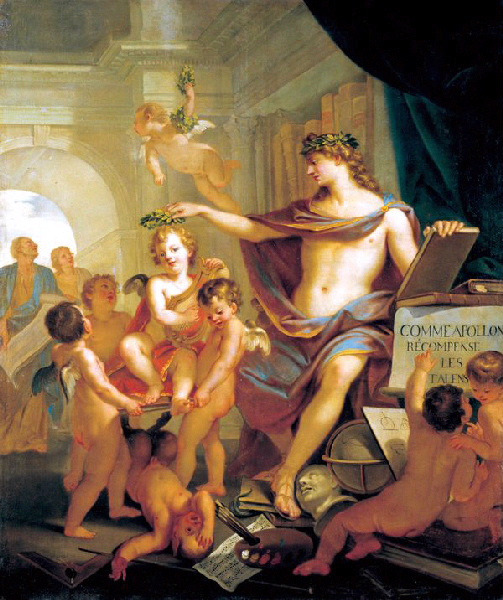
#the myth of apollo#apollo#phoebus#greek mythology#poetry#renaissance#greek gods#sun#symbols#symbolism of the sun#solar myth#roman mythology#diana#dionysos#symbolism
15 notes
·
View notes
Text
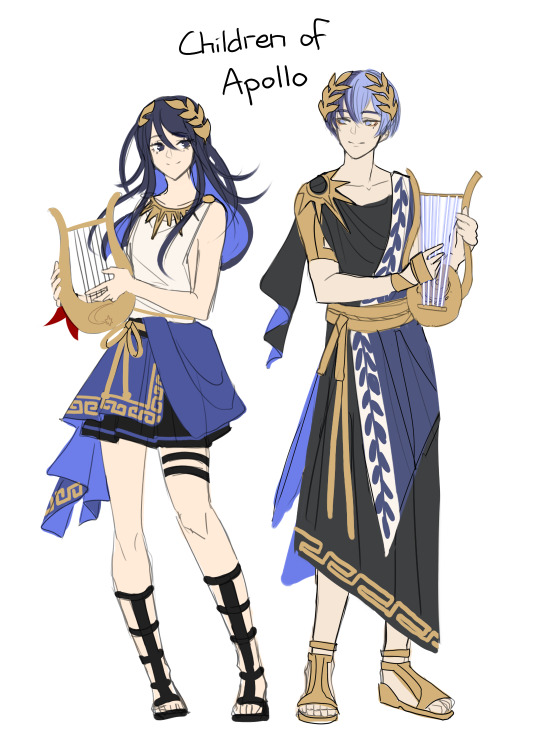

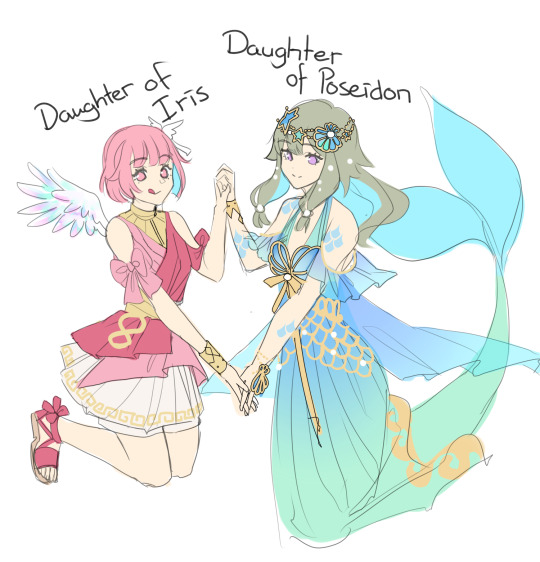

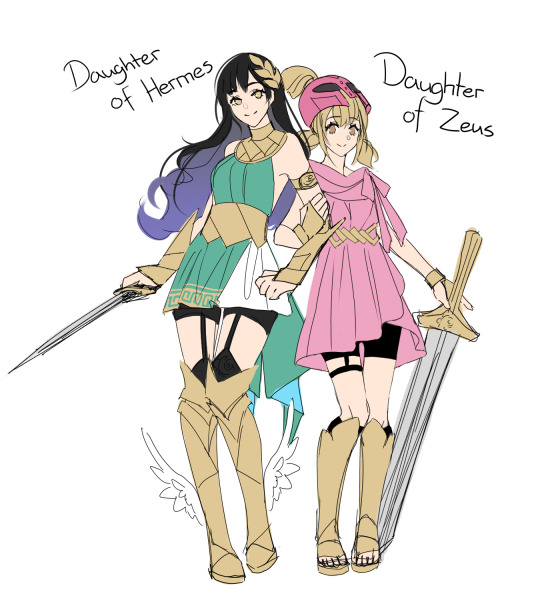

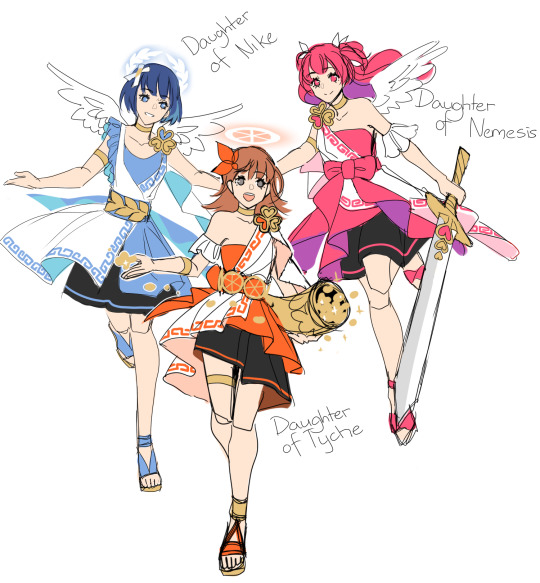
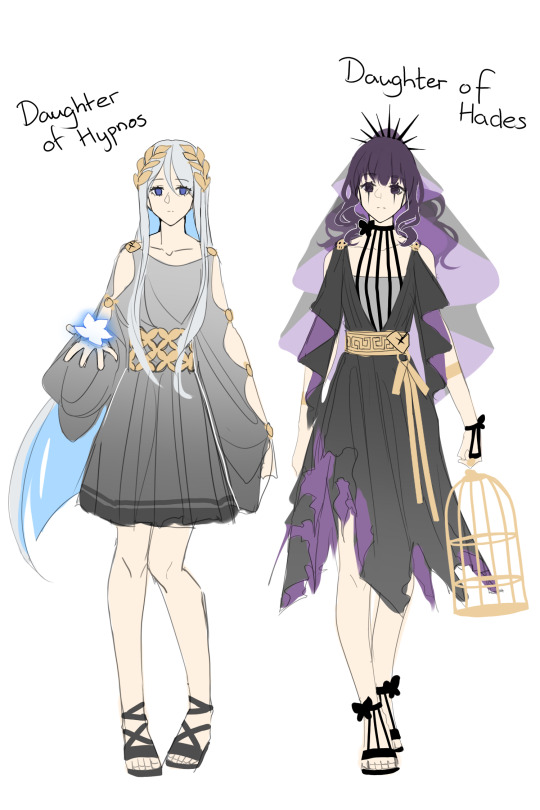
Started as a random crossover between Proseka and Greek mythology/PJO. Then it went out of control. And then halfway I got lazy.
My personal favourite is Shiho's design. And Nene's, but does it really count as my design if half of it is literally from the game?
#my art#character design#greek mythology#greek myth art#crossover#crossover au#pjo#pjo series#proseka#project sekai#children of apollo#children of aphrodite#child of hypnos#child of hades#child of hephaestus#child of demeter#children of dionysus#child of nike#child of tyche#child of nemesis#child of zeus#child of hermes#children of ares#child of iris#child of poseidon
1K notes
·
View notes
Note
can u draw apollo holding dead hyacinthus
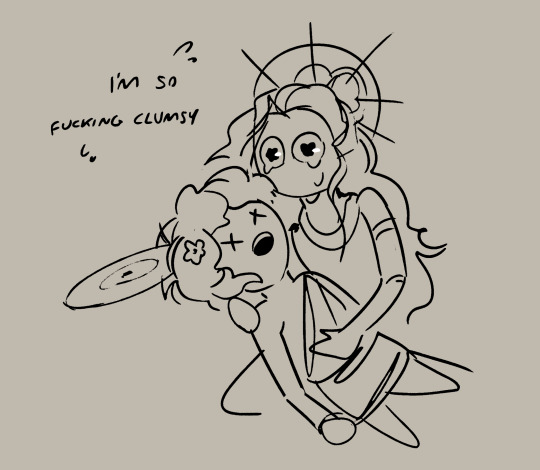
there you go
#i'm sure that's the exact drawing you had in mind#gigi's asks#digital art#art#greek myths#apollo and hyacinthus
568 notes
·
View notes
Text
just imagine a boy flirting with a girl in ancient greece and he tells her "you're prettier than aphrodite" and instead of blushing and saying "thank you" she goes BRO ARE YOU KIDDING ME ARE YOU OUT OF YOUR MIND WHY THE F*CK DID YOU SAY THAT DO YOU WANT ME F*CKING DEAD OR WHAT
#greek mythology#greek gods#greek mythology memes#aphrodite#apollo#dionysus#hades#hermes#ares#artemis#athena#demeter#hephaestus#hera#hestia#poseidon#zeus#mt olympus#greek myth memes#greek myth retellings
4K notes
·
View notes
Text

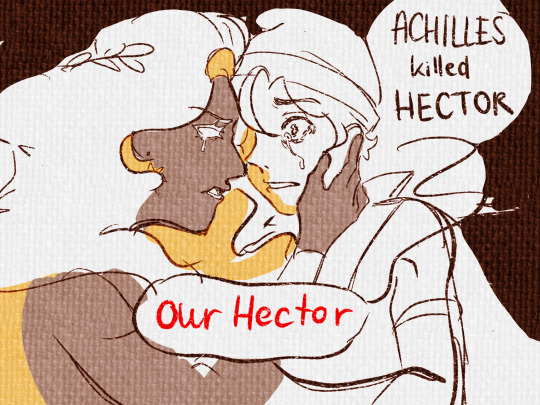
achilles n his silly actions
#greek myth art#greek mythology#achilles#apollo#the trojan war#paris of troy#poor sketches#poor them
684 notes
·
View notes
Text
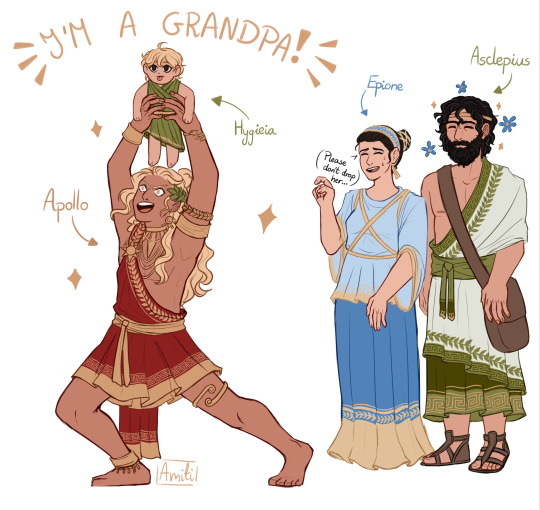
Dadpollo this, dadpollo that, but what about grandpa Apollo
#Apollo#asclepius#epione#hygieia#greek panteon#greek myths#greek gods#apollon#my art#character design#children of Apollo
2K notes
·
View notes